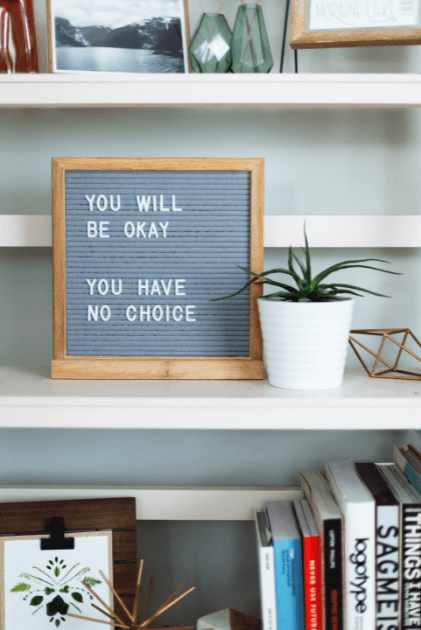Judgment Can Kill You: How I Saved Myself
Judgment comes to us so naturally. We judge others, we judge ourselves, and we judge situations… As humans, we are naturally inclined to judge!
Have you ever stopped to wonder why we are so judgmental? Are you curious about what drives our negative thinking behaviors? Do you want to learn to tone them down so that you can free your mind from judgment?
I wanted this as well, and I achieved it. Now I am going to teach you how to do it too!
It is easy to hold judgment, it is understanding that is difficult. Understanding, not only others but yourself, takes compassion, empathy, and self-reflection. These things do not always come easily, and they take a lot of practice and conscious effort to achieve. However, it can be done…
Understanding is scary because it forces us to admit we do not have all the answers. Empathy can make us feel insignificant in the grand scheme of things. The process of avoiding judgment makes us feel small. Yes, understanding is hard… but it is also very rewarding.
By learning to avoid judgment, you will…
- Open your life to the beauty and wonder of the world.
- Live a more peaceful existence.
- Feel less anger.
- Think more clearly.
- Enjoy more satisfaction..
- Be happier and healthier.
The idea of being able to completely put an end to the judgmental thought cycle is not practical. Instead, your goal should be to gain awareness and control over your thoughts and form a deeper understanding of others.
Your inclination to judge others may not be your fault…

In social psychology, ‘The Fundamental Attribution Error,‘ also known as correspondence bias, can help to explain why we are so quick to pass judgment. The Fundamental Attribution Error (FAE) is used to explain the emphasis that is placed on situational or environmental causes for our own behavior compared to the personality-based emphasis that we put on the behavior of others.
For example, when we see someone getting angry in line at a shop, we will often think, ‘what a bitch.’ Yet, when we get angry while out shopping we might think, ‘the store is too crowded,’ or ‘It is late and hot, which makes me grumpy.’
Notice the difference between these examples.
When looking at someone else’s behavior we often assume that they are the cause of it. However, when looking at our own behavior we tend to place blame on outside factors first.
I wanted to share this term with you because it was through learning about this term while in University that I started to see a bigger issue. This term is one of the things that inspired me to switch to a degree in psychology. In fact. it was the discovery of this term that made me recognize that I had a real problem.
No, the issue did not resolve itself, and my tendency to judge did not go away overnight either. Change is challenging for us all. It takes time and effort to correct negative behaviors. Especially ones that are as deeply ingrained as judgment.
Keep reading and I will share how I managed to overcome my judgmental ways and eventually free my mind…
Judgment was my middle name.

For far too long I would constantly judge everything in my life, including myself. Not a day would go by without me having a negative, judgmental thought. Whether these thoughts were about myself or someone else, they became a way of life for me.
This pattern of negative thinking began to take its toll on my well-being, and I was not even aware it was happening
There are so many annoying, ignorant, incompetent people in the world. and it can be challenging to interact with them every day.
Listen, I get it. I really do.
Unfortunately, the fact that I know you know this, tells me that you are a judgmental bitch, just like me.
But don’t worry…
Our judgmental behavior is just an aspect of evolution.
Judgment was once a necessary act of evolution. In fact, it is probably due to this human inclination that we exist today. Think about cavemen. If they had not been weary and constantly judging every little thing, they may have suffered a very unpleasant fate. Fortunately for cavemen, it was this innate human need to judge everything that kept them alive.
I suppose this aspect of human behavior was deeply ingrained within me because for a long time I was quick to judge without any consideration to others. Rarely did I think about why someone was doing something, or what was causing the behavior. I often refused to reflect on this when it came to my own actions. Instead, I made assumptions and formed opinions that were not based on facts, had very little merit, and were drowned in cold-hearted judgment.
My selfish approach to stopping judgmental thoughts…
As I said, my way of negative thinking began to take its toll, and I will admit that my change began as a somewhat selfish goal.
I did not like the way that I was constantly judging myself or my own behavior. I was extremely self-critical and because of this, I often felt that I could not measure up to my standards.
This way of life was exhausting.
I was miserable, angry, and lonely. Due to this, I could not hold down a relationship. I could not stop judging others or myself and it was making me miserable. The truth is, I was unhappy, bitter, and alone. Over time this made me depressed.
Thankfully, I woke up one day and made the choice to change my way of thinking. This choice ended up changing my entire life!
How I freed my mind from judgment and embraced understanding:
Freeing yourself from self-critical, judging thoughts takes time and effort. There is no switch you can shut off, and people do not come with manuals as televisions or electronics do. When we notice behavior that we do not like, we need to make the conscious choice to change it. There is no other way.
Pay attention to your thoughts:
The first step on the road to a judgment-free life is learning to listen to your thoughts. After all, if you do not know what you are thinking, how can you change the way you think?
Pay attention to the thoughts that go through your mind each day. Are these thoughts good for you? Would you share them with others? While some of your thoughts will be normal, boring, and even helpful, you will find that many are not.
Focus on the negative thoughts that you have. These will be the ones you want to change to reduce the level of judgment in your life.
For example, rather than thinking about how annoying a co-worker is, think of how helpful or funny they are. Seek out what they add to your life, not the stress that they cause.
If you need some inspiration, check out The One Thing Challenge and rethink it to use when dealing with others!
Adjust your view:
A significant step in ridding your mind of judgment is seeing things from a new perspective.

I have said it many times before, it is impossible to know what someone else is thinking or feeling. Even if you think you have psychic abilities, you can never truly know someone else’s thoughts.
One of the first things that I do when I notice that a judgmental thought has entered my mind is to stop and consider things from a different perspective.
Looking at a person or situation from a differing perspective can give you a great deal of insight.
It is also important to reframe negative thoughts and focus your energy on the positive aspects of the situation.
Like the example of the co-worker that was given above, try to find one positive thing to focus your energy on.
Stay tuned by subscribing to this site for more on this topic in the coming weeks.
Embrace curiosity to erase judgment:
A lack of curiosity can greatly increase our judgmental behaviors. The more that we know about a person or situation, the more likely we are to embrace it as a part of our identity.
Do you remember a time when you thought that you hated a certain type of food only to later realize {after you tried it} that you actually enjoyed it? Humans can be very close-minded. Open yourself to new experiences and you may discover something that you love!
Understand empathy.
Empathy is the ability to understand the thoughts and feelings of another, especially when they differ from your own beliefs.
There are thought to be 3 types of empathy, Cognitive, Emotional, and Compassionate empathy.
Cognitive Empathy – Perspective taking. The ability to understand the view of others.
Emotional Empathy – Understanding how someone else feels. This can be good and bad because it can deeply impact you if you feel too much of their emotions
Stay tuned for a future post on empaths
Compassionate Empathy – This involves noticing someone else’s pain and taking action to help. This is the most common and well-known type of empathy.
Empathy takes practice to master. Yet it is worth the effort because empathy is a great way to control judgments. Stop and think about how you would feel in a situation. However, you need to do this as if you are the other person and use this as your moral compass. The key here is to understand that you and them think and feel differently.
You need to be able to truly see things from their side, and this level of understanding takes time to build.
Practice mindfulness
Practicing mindfulness requires that you are present in the moment and aware of your thoughts.
The things that we think will tell us more about ourselves than they will about others. Pay attention to the thoughts that go through your mind when you are making judgments. What do these thoughts say about you?
By becoming aware of our thoughts and understanding that they are merely a reflection of ourselves, we can begin to adjust our judgmental behavior.
Have self-compassion

If you find that you judge others often, remember, judgment is more about you than it is about the other person.
Our judgment stems from our own insecurities. Once you learn to have self-compassion and to forgive yourself for having flaws, you will find that your judgment fades.
Change your mind.
The biggest problem with judgmental thinking is not the impact it can have on our relationships, although this is significant. Rather, the biggest issue with judgment is the effect it has on you and your overall wellness.
Sure, Judgment decreases your ability to connect with others. Whether you are judging them or yourself, it plays a role in the way you will interact.
The negative tone of judgment hinders your ability to be your authentic and amazing self.
When we are plagued with judgment, we are held back from connecting with others or achieving our goals. This is because judgment limits the opportunities we have in life.
Learning to train your thoughts and free yourself from judgment will open you up to the world and lead to a happier, more fulfilling life.
Until Next Time,
Train your brain to be positive. not negative!